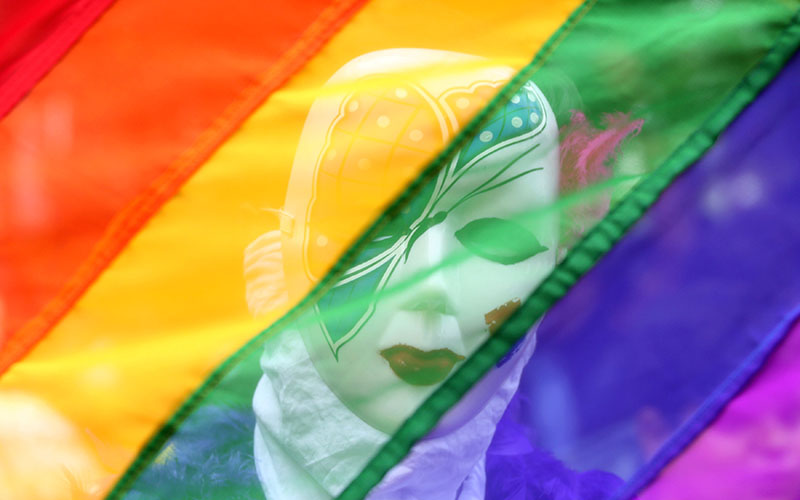Indian trailblazers #RideWithPride after gay sex ban lifted
MUMBAI: Bollywood makes a lesbian rom-com, a transgender woman bags a key opposition party post and judges green light same-sex couples living together - just some of the groundbreaking firsts since India legalised gay sex four months ago.
But the largely conservative country is far from accepting and giving equal rights to LGBT+ people, experts said, despite the top court's September repeal of Section 377, introduced during British rule more than a century-and-a-half ago.
"It is the beginning of a long and arduous struggle and not the culmination. Do we have adoption, spousal or inheritance rights?" said well-known fashion designer Sunil Mehra, one of the petitioners in the Supreme Court against Section 377.
"But these (firsts) are straws in the wind, all blowing in the right direction," Mehra told the Thomson Reuters Foundation.
Depictions of LGBT+ people on television have improved since the verdict, moving away from mocking stereotypes to include gay men on dating shows and a drag queen in a singing competition.
Trailblazing political and legal decisions are also chipping away at prejudice in a country where many LGBT+ people are afraid to be open about their sexual and gender identities.
ROMANTIC
The courts have been quick to respond to decriminalisation, ruling in favour of petitions by same-sex couples to be allowed to live together.
Lesbians often seek legal protection out of fear that their families will get the police to trace them if they secretly move in with a partner and could become violent when they find out the truth.
In petitions she filed for same-sex couples before the Supreme Court ruling, lawyer Tripti Tandon ensured the plea had no hint of sexual orientation, but simply said that they, as adults, wanted to leave home.
"But now, our first paragraph in the petition is that these two women are in a relationship and want to live as romantic partners," said Tandon, who won a case in October in the Delhi High Court for a lesbian couple who wished to live together.
"There was no convincing (required) and the court passed the order as it would in the case of a boy and a girl and asked the police to protect them. It made no difference to the judge he was dealing with a same-sex couple."
Tandon, also deputy director of human rights organisation Lawyers Collective, said she is handling several such cases and they are becoming increasingly common.
'MEANINGFUL PLACE'
On the political stage, 34-year-old Apsara Reddy, a transgender journalist and activist, plans to use her new position as general secretary of the women's wing of India's main opposition Congress party to push for greater equality.
"Transgender women need equal opportunity ... and the starting point is to be to treat us as equals and not look at us as somebody who needs rehabilitation or cure," said Reddy, who was appointed by Congress, India's oldest party, last week.
"I think I am here today because I believe there is a better tomorrow and there is a meaningful place for me ... All my life, I was told that as a transgender woman you will never be good enough ... opportunities won't come your way."
Reddy said she will oppose the Transgender Persons Bill, which is due to be tabled in the upper house of parliament despite warnings from activists that it could leave the marginalised population more vulnerable to abuse.
Campaigners, however, said Reddy's appointment may not be a life-changing moment for the community.
"All 'firsts' become sensational. But what are we doing to uplift the community?" asked Neelam Jain, founder of PeriFerry, a social enterprise that works for transgender employment.
#RIDEWITHPRIDE
Bollywood's first mainstream romantic comedy with a lesbian lead character - "Ek Ladki Ko Dekha Toh Aisa Laga" meaning "When I Saw That Girl, I Felt" - is being hailed as a gamechanger ahead of its release next month.
Bollywood has made films featuring gay characters before, but the popularity of the stars in this one, backed by a major production house, means it will be widely watched.
Actor Sonam Kapoor Ahuja plays the lesbian daughter of her real-life father, veteran actor Anil Kapoor, who is looking for a suitable boy for her as she hides her 'secret'
"This is probably going to be the most mainstream of films because you've got people like Anil Kapoor and Sonam Kapoor who are as mainstream as Indian cinema gets," said Keshav Suri, a prominent hotelier and petitioner against Section 377.
The film - complete with Bollywood song and dance routine - is being promoted with the tagline "Accept love for what it is".
The advertising world is also stepping up its interest in LGBT+ consumers, with an outpouring of business support for gay rights since the verdict.
"We counted nearly 80 (new LGBT+ commercials), many of them from Indian companies," Koninika Roy, advocacy manager at Humsafar Trust, a non-profit that works for the LGBT+ community.
A deodorant brand chose the punchline "attraction has no rules" for its advert while a company selling tyres is using #RideWithPride for its social media campaign.
"Conservative brands are now moving to progressive narratives," said Suraja Kishore, executive vice president, of the ad agency McCann in Mumbai.
The new-found corporate interest signals a major change from 2013, when the Supreme Court overturned an earlier ruling that had lifted the ban on gay sex, and companies distanced themselves from LGBT+-themed events.
An annual queer film festival 'Kashish' in Mumbai lost sponsors then but its director Sridhar Rangayan is hopeful of better sponsorhip this year.
"The cloud of criminality has lifted," said Rangayan, whose film "Evening Shadows" about a gay son struggling to come out to his parents released was last week.






